Crucial M550 Review: 128GB, 256GB, 512GB and 1TB Models Tested
by Kristian Vättö on March 18, 2014 8:00 AM ESTRandom Read/Write Speed
The four corners of SSD performance are as follows: random read, random write, sequential read and sequential write speed. Random accesses are generally small in size, while sequential accesses tend to be larger and thus we have the four Iometer tests we use in all of our reviews.
Our first test writes 4KB in a completely random pattern over an 8GB space of the drive to simulate the sort of random access that you'd see on an OS drive (even this is more stressful than a normal desktop user would see). We perform three concurrent IOs and run the test for 3 minutes. The results reported are in average MB/s over the entire time.
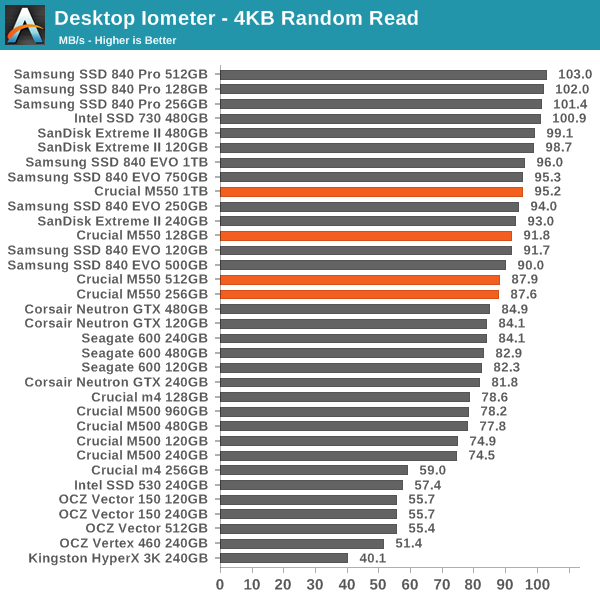
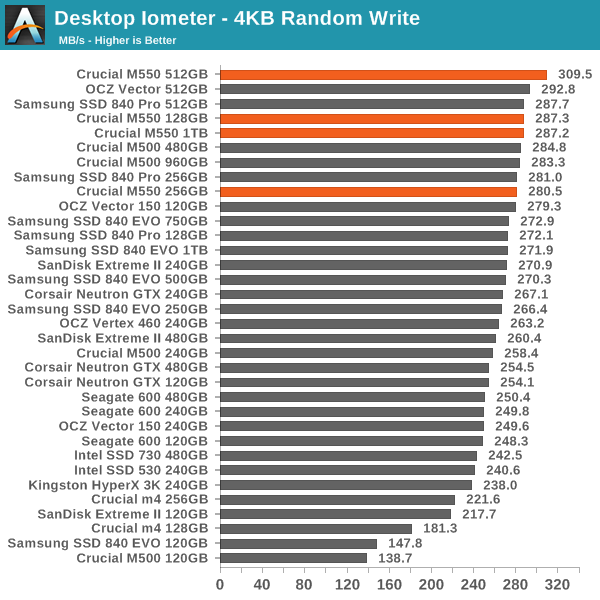
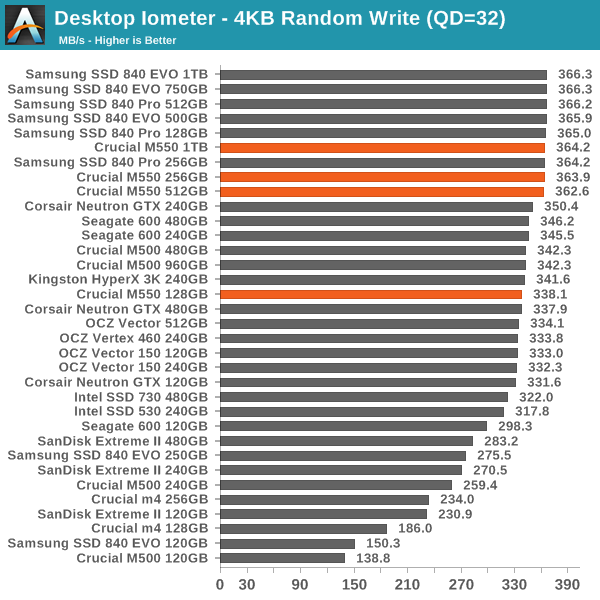
Random performance is strong when dealing with an empty drive but as the two previous pages show the big picture isn't as pleasant. The difference between 64Gbit and 128Gbit NAND is very clear here as the M550 is up to twice as fast as the M500 at the smaller capacities.
Sequential Read/Write Speed
To measure sequential performance I ran a 1 minute long 128KB sequential test over the entire span of the drive at a queue depth of 1. The results reported are in average MB/s over the entire test length.
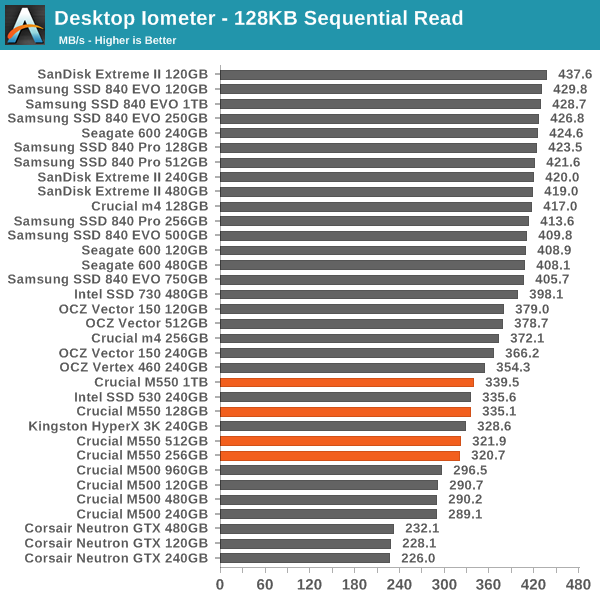
Sequential speeds are up quite a bit from the M500 as well but the read performance is still a bit lacking.
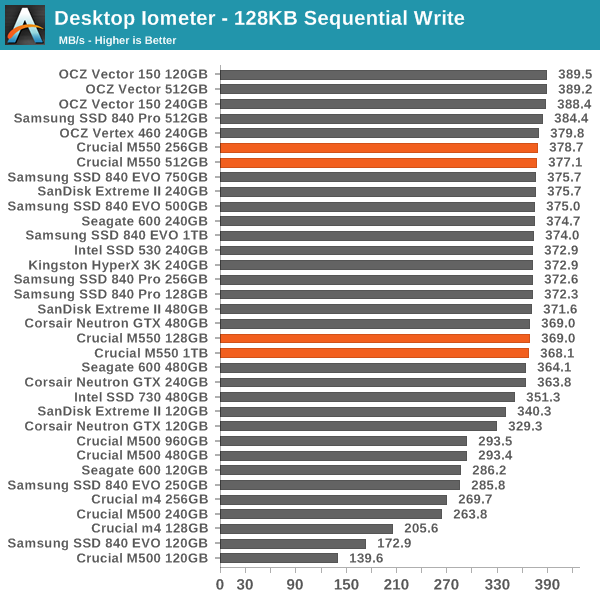
AS-SSD Incompressible Sequential Read/Write Performance
The AS-SSD sequential benchmark uses incompressible data for all of its transfers. The result is a pretty big reduction in sequential write speed on SandForce based controllers. Again, the M550 shows a decent improvement over the M500, particularly at the lower capacities.
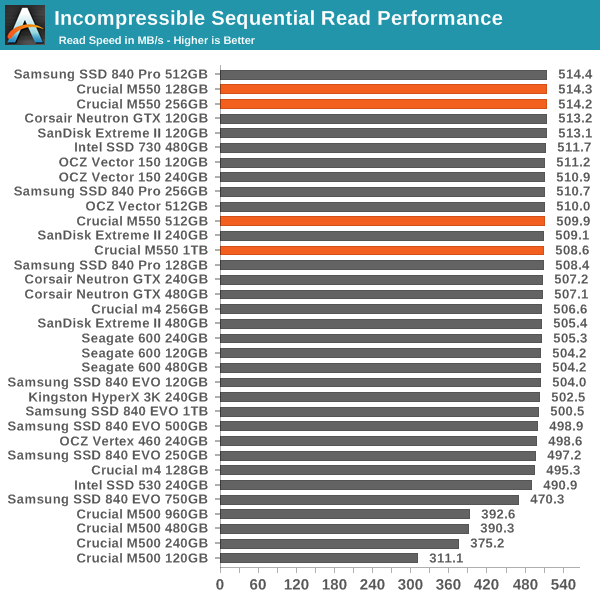
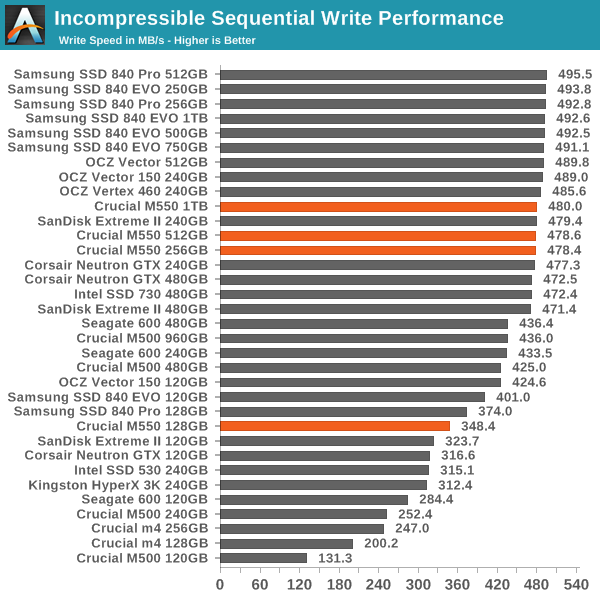










100 Comments
View All Comments
anh14 - Thursday, March 20, 2014 - link
you nailed that ; all differences are just academic . Everyone always talks about 'faster' but not about how preventing it of making your computer slower i.e. taking your storage of the critical paththe only thing with the earlier SSD's are some of them become excessively slow and resetting them is a pain.
I have a stack of patriots 32Gb that are collecting dust and that OCZ Vertex 2 64 SSD, interesting you mentioned it, I do have that one still but it is my backup C-disk that is in my drawer (e.g. if things go south, I replace the intel 520 I am now using have with this guy which is still better than any slow poke HD)
nathanddrews - Tuesday, March 18, 2014 - link
Coming from a HDD, any modern SSD will be subjectively comparable. Unless you've got a really read or write heavy task, it's really just splitting hairs. I've owned eight SSDs since I bought my first 80GB Intel SSD and I still have all of them in working order (only the largest/newest ones are boot drives, the rest are in external enclosures or serve as scratch drives). Anyway, until we get an interface with considerably higher speed (1-2GBps) and a cost per GB of $0.25 (2TB SSD for $500), the SSD market is just boring IMO.hojnikb - Tuesday, March 18, 2014 - link
We are already headed to sata-express + flash is rapidly getting cheaper nowdays, so 2TB ssd for a reasonable price is not that far away. Another dieshrink (so we get 256Gbit dies) and maturing of sata-express controllers and this will become a reality.jospoortvliet - Thursday, March 20, 2014 - link
Prices haven't really been going down all that fast lately so I wouldn't count on it anytime soon.dishayu - Thursday, March 20, 2014 - link
Sadly,I have to agree with this. I bought a 128GB Plextor M5 in mid 2012 for 84$. That's still the price point where 128GB SSDs sell today.hojnikb - Thursday, March 20, 2014 - link
You do realize u got a heck of a deal for that ssd, right ?Death666Angel - Friday, March 21, 2014 - link
Prices for small capacity SSDs have been relatively stable, but the 256/512 sizes have really dropped. I remember buying a 500GB Samsung 840 for 320€ (December 2012) and the equivalent Evo 500GB now costs 210€.hojnikb - Thursday, March 20, 2014 - link
I disagree.Just check m500 prices lately..
HisDivineOrder - Tuesday, March 18, 2014 - link
Pricing is the thing they need. Performance gets ridiculous past a certain point with the given ports we have.GASOLINENL - Tuesday, March 18, 2014 - link
I read a very technical article about this. In theorie SSD's survive 75 years. Due to different things a very heavy user (lots of writing etc) will kill a SSD after 25!!!! years. So they are great.